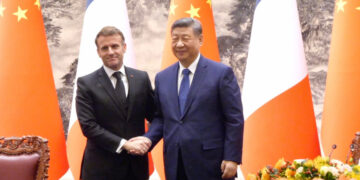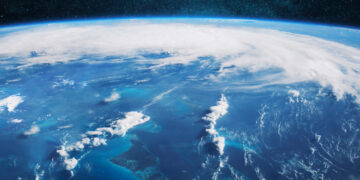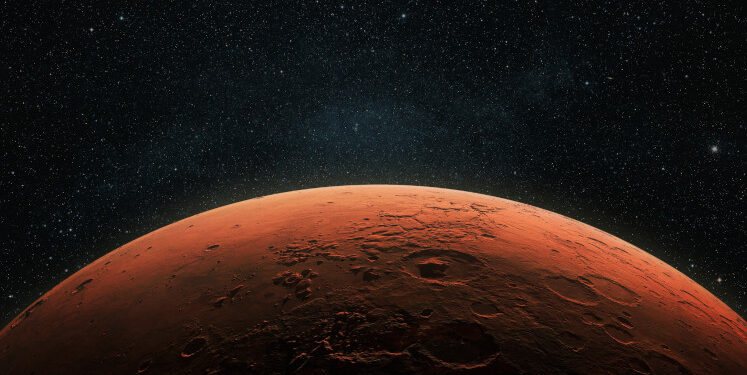In an interview with Maayan Arad, Dimitrios Stroikos discusses the future of space exploration and how conflicts between states are now playing out in space.
Space is unimaginably vast. When we talk about space exploration and human activity, what are we trying to achieve and what are the prospects for venturing further in the future?
Intuitively, when we talk about space and especially the politics of space, we think about space exploration, the colonisation of other planets, exploiting the Moon, asteroids and so on. But we tend to forget the extent to which space is so integral to our daily lives.
GPS is a good example of how we use it. We also depend every day on the space economy, which is integral to the broader economy. Financial transactions depend on space technology, while space research plays a vital role in dealing with urgent challenges such as climate change. Space is also very important as a force multiplier where it enhances military capabilities on Earth.
There is currently a bit of hype about exploiting resources in space, for example by mining asteroids. I think we’re not quite there yet. There is definitely interest, but there is a big question about whether we have the technology to take advantage and to exploit lunar resources, for example, or establish settlements on the Moon or Mars.
This might be possible, but it’s also worth keeping in mind that these projections have been there since the beginning of the Space Age. Back in the 1950s and 1960s, there was the expectation that we would already be travelling from one planet to another. Capturing the public imagination has been a very important aspect of space exploration and space travel, but while space exploration is a very important aspect, it doesn’t capture the majority of activities taking place in space today, which are largely within orbital space.
Who are the major actors in space exploration today?
The United States is still the leading power in space activities in the world. I would argue that China is now number two, although this risks making an oversimplification. Russia is still a very important player in space, but also a space power in decline for many reasons.
And then we’re also seeing other emerging space powers. I would highlight India as an important rising space power. There are other countries with important space capabilities, such as Japan and Brazil. Within Europe, there are what could be called “middle powers” in space, such as France and the UK. And there is also interest from other European countries.
An argument can be made about whether Europe as a whole ranks as an important player in space. I would argue that it could be seen in this way, but we’re also seeing the democratisation of space activities. This reflects on the one hand the growing interest of countries from the Global South that have an interest in space activities, especially in the context of using space for socioeconomic development. The number of countries with a stake in space has increased dramatically and now numbers roughly 80 countries.
On the other hand, democratisation can also refer to the involvement of non-state actors and private entities in space. Many people are familiar with SpaceX, but there are also many other companies and other non-state actors that are participating and have a stake in space activities.
The original space race grew out of a nuclear arms race during the Cold War. Do you think recent interest in space exploration is driven by nationalism or is it something else?
We can talk about different space races. There is this notion of an Asian space race, for example, that involves China, India and Japan, and more recently South Korea. There has also been a great deal of debate about the extent to which there is a space race between China and the United States.
And then there is the space race between private companies about who is going to get a bigger portion of the growing space market. With respect to satellites, we are seeing how successful Elon Musk’s Starlink has been. There are many other companies and countries that now also have an interest in developing satellite internet constellations.
This poses a lot of challenges as well. For example, how do we keep accountability in space, especially for private actors? This is something that we haven’t thought about much, but it’s going to be very important in the coming years.
But nationalism is still a very important force. Highly visible space projects such as space exploration and human spaceflight have historically served as indicators of a state’s power and prestige. And this still underpins space projects today, for example as part of China and India’s post-colonial identities.
We’re witnessing a period of increased tension between global powers and we’ve been hearing more about space weapons and the militarisation of space. To what extent should we be concerned about these developments?
The militarisation of space is very important. It has been there from the beginning of the Space Age. During the Cold War, satellites were used to support critical elements of military operations such as surveillance, reconnaissance, intelligence and communications. The significance of these operations is still there, but with the end of the Cold War, we have seen a shift from this strategic dimension of space operations to the importance of space-based assets as a force multiplier.
GPS played a key role during the first Gulf War, which is also referred to as the first “Space War” because of the dependence that military troops had on using GPS. But today we’re also seeing a shift towards treating space as an actual theatre of warfare. There are many types of space weapons, including anti-satellite weapons, electronic attacks, jamming and spoofing, directed energy, lasers and cyberattacks.
We’re also seeing more military activities taking place in space now, with satellites trying to blind other satellites or manoeuvring closer to them. There’s no framework through which we can say whether these are malign activities or not, so there’s a need to set some guardrails there.
There is another important dimension that we don’t talk much about, which is nuclear weapons. Space-based assets continue to play an important role in the context of nuclear deterrence and early warning systems. Now, with the commercialisation of space, some private satellites might be part of this nuclear deterrence architecture.
The key question, though, is what if your enemy doesn’t know about that and tries to attack one of those satellites? You may believe there is an intention to escalate into a nuclear conflict, despite the other side being unaware the satellite was part of nuclear deterrence. This is one reason why we need strategic dialogue between rivals in space.
This is especially true for China and the United States, as two nuclear powers and two important space powers. There is the need to have a framework for dialogue and to build some sort of trust. This is, of course, very, very difficult, but it is essential for safeguarding stability and security in space.
We’ve seen a lot of wars in space play out in movies and in books. But what would real conflict in space look like?
It depends how you define war in space. There are certain activities in space now that fall just below the threshold of warfare, such as blinding other satellites. There have been many recent cases of attempts to interfere with GPS, notably during the war in Ukraine. This also poses a threat to aviation and raises the possibility of an accident happening.
We have seen a shift from destructive to non-destructive space weapons, such as cyberattacks. Destroying a satellite can generate debris that can also mess up your own space-based assets. The United States, for example, has launched an initiative to ban anti-satellite tests that generate debris. But it remains to be seen how effective this will be when an actual war between great powers takes place, which hopefully won’t happen.
Let’s talk a little bit about cooperation in space. There are 15 countries that currently contribute to the running of the International Space Station. How significant is this cooperation between global powers in space and are we seeing enough collaboration?
That’s a great question. As we were mentioning before, the militarisation of space has been there from the beginning of the Space Age, but we shouldn’t forget that cooperation was also an important aspect of space activities from the beginning. We tend to forget, for example, that Sputnik was launched as part of the International Geophysical Year, which was one of the most successful and bigger scientific advances.
Since then, you have on the one hand nationalism as an important driving force of space activities, but on the other hand, scientific internationalism has also been very important. I think this rationale is also still there and that competition and cooperation coexist in space. The International Space Station is the epitome of this, as even during the war in Ukraine, Russia has continued to cooperate with the International Space Station.
But in many ways, the International Space Station is also a product of a specific period. After the end of the Cold War, the political climate around that time was very different between Russia and the United States. It remains to be seen how the current geopolitical tensions will affect cooperation.
On the other hand, there is a lot of cooperation taking place every day, such as using space-based assets for disaster monitoring. China has its own space station now and it cooperates with many countries in the developing world. NASA continues to be a very important actor in pushing forward international collaboration with other countries as well.
There is also the way we use space-derived data in our daily lives. This requires a lot of people doing work every day and this work involves a lot of cooperation. We tend, again, to forget that, perhaps because these activities are not as visible as the militarisation of space or space exploration.
This interview features extracts from “Who owns outer space?“, an LSE iQ podcast episode.
Note: This article gives the views of the interviewee, not the position of EUROPP – European Politics and Policy or the London School of Economics. Featured image credit: Alones / Shutterstock.com






































Discussion about this post